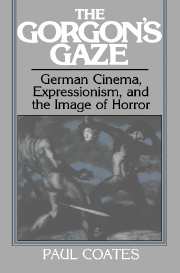Book contents
- Frontmatter
- Contents
- Preface
- Acknowledgments
- Introduction: The uncanny and the gorgon's gaze
- I Silent cinema and expressionism
- II The sleep of reason: Monstrosity and disavowal
- III Memory and repression in recent German cinema
- IV Expressionism in America
- V Elective affinities and family resemblances: For Margarethe von Trotta
- Appendixes
- Notes
- Selected bibliography
- Filmography
- Index
Introduction: The uncanny and the gorgon's gaze
Published online by Cambridge University Press: 21 October 2009
- Frontmatter
- Contents
- Preface
- Acknowledgments
- Introduction: The uncanny and the gorgon's gaze
- I Silent cinema and expressionism
- II The sleep of reason: Monstrosity and disavowal
- III Memory and repression in recent German cinema
- IV Expressionism in America
- V Elective affinities and family resemblances: For Margarethe von Trotta
- Appendixes
- Notes
- Selected bibliography
- Filmography
- Index
Summary
The world becomes uncanny when it is perceived as no longer simple substance, but also as shadow, a sign of the existence of a world beyond itself, which it is nevertheless unable fully to disclose. The uncanny sign is not allegorical, for it only suggests the presence of another world. Such suggestivity may seem to render it akin to the symbol, but it is in fact neither symbol nor allegory; it lacks both the transparency of the allegory and the positivity of the symbol. It is frustrated allegory, negative symbol.
The uncanny world is a world of conspiracy. It is experienced as such by the modernist imagination, with its fascination by – and anticipation of – total systems. In his famous essay “The ‘Uncanny,’” Freud may have noted sardonically his own lack of an instinct for its perception, but he is nevertheless himself enough of a modernist – sufficiently interested, like the great modernist novelists, in the creation of a personal encyclopedic system – to be able to cite an experience of the uncannily that itself uncannily resembles the accounts Hofmannsthal or Mann give of passage through Venice, that labyrinthine deathly city of alienated desire:
Once, as I was walking through the deserted streets of a provincial town in Italy which was strange to me, on a hot summer afternoon, I found myself in a quarter the character of which could not long remain in doubt. [...]
- Type
- Chapter
- Information
- The Gorgon's GazeGerman Cinema, Expressionism, and the Image of Horror, pp. 1 - 17Publisher: Cambridge University PressPrint publication year: 1991

